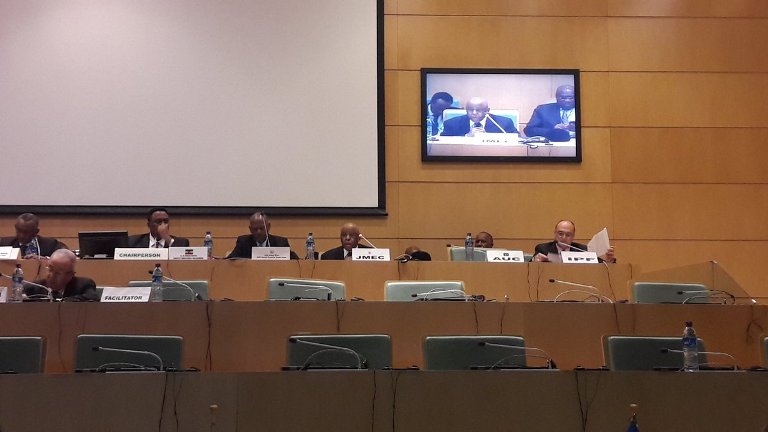IGAD warns spoilers of South Sudan’s peace process

December 18, 2017 (JUBA) – The Intergovernmental Authority Development (IGAD) Council of Ministers has threatened to take punitive measures against spoilers of South Sudan’s peace process.
The regional bloc, in a statement during Monday’s launch of the revitalization forum, vowed to take necessary actions against individuals and groups that spoil or derail the revitalization process from progressing.
The five-day forum provides a unique opportunity to bring IGAD, regional and international parties together towards ending the conflict in South Sudan with the help of stakeholders on the negotiation table.
“In this regard, the Council [of ministers] calls upon the TGoNU [Transitional Government of National Unity], and all South Sudanese parties to focus on the higher goal of the national interest, and securing the future of the South Sudan,” the statement reads in part.
The Council, however, noted with deep regret that in spite of the continuing efforts by the East African regional bloc, the African Union and the United Nations as well as the contributions from the other international partners, the peace in South Sudan remains elusive.
Only a full and timely implementation of the peace agreement and effective enforcement mechanism will deliver a comprehensive and lasting solution to the South Sudan crisis, further stressed the Council.
LEADERS SPEAK OUT
The Ethiopian Prime Minister, Hailemariam Desalegn, said during the opening session of the revitalization forum on Monday that the two South Sudanese warring factions should leave their differences aside.
Desalegn, also the IGAD Council of Ministers chairperson, who urged the South Sudanese warring parties to do their part for the peace and stability of the war-torn nation, stressed that the five-day forum in Addis Ababa provided the last opportunity to ensure peace in South Sudan.
He warned IGAD will take necessary actions if current peace efforts fail.
The African Union chairperson, Moussa Faki said there have been many opportunities to put an end to this tragedy over the last four years, citing the peace agreement that was signed in August 2015.
“But these opportunities have never been seized. And the reasons are as simple as they are distressing,” said Faki.
The AU chief, speaking at the forum launch, also blames South Sudan’s woes on the “failed” political will from the country’s leaders.
“You [South Sudan leaders] must realize the second and final phase of the fight for freedom that the SPLM [South Sudan ruling party] was, at other times, carrying, by acting in a way that respects the right to life, the aspiration to the well-being of your compatriots,” said Faki.
He also said too much time had been lost and the urgency is great.
“You cannot leave this forum without solemnly and sincerely committing to an immediate end to violence and building on such a foundation to accelerate the journey towards peace and reconciliation,” stressed the AU chief on Monday.
The Troika (Norway, United States and Britain) described the revitalization forum as a “new chapter” in the quest for peace in the war-torn East African nation.
“All parties must engage sincerely and make concessions in the national interest; otherwise, the conflict and suffering will continue,” the Troika said in a statement.
Meanwhile, the IGAD council of minister, during its 59th extra-ordinary session, also emphasized that IGAD member states have followed with concern the continuation of the senseless violence in South Sudan, which is inflicting enormous pain and suffering on the South Sudanese people, and has resulted in massive displacement of the population, a dire humanitarian situation, and the devastation of the economy unprecedented in the history of South Sudan.
Violence broke out in South Sudan in December 2013 after a political dispute between President Salva Kiir and his former deputy, Riek Machar saw a split within the ruling party (SPLM). The 2015 peace agreement, which temporarily ended the war and saw a coalition government formed, collapsed in July 2016 as renewed violence forced Machar out of the capital, Juba.
(ST)
